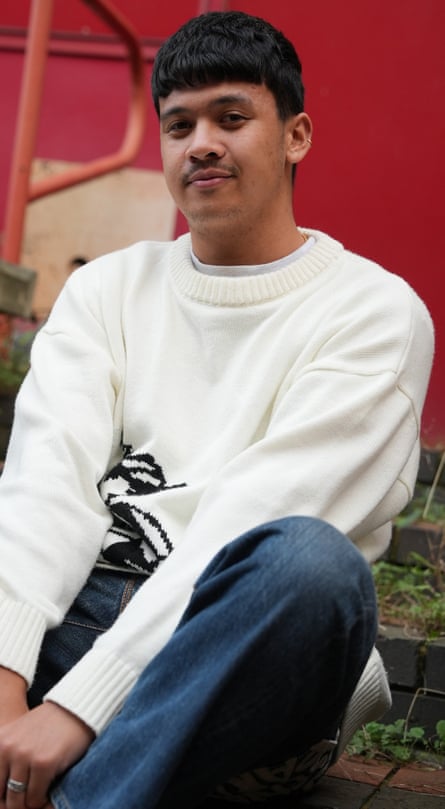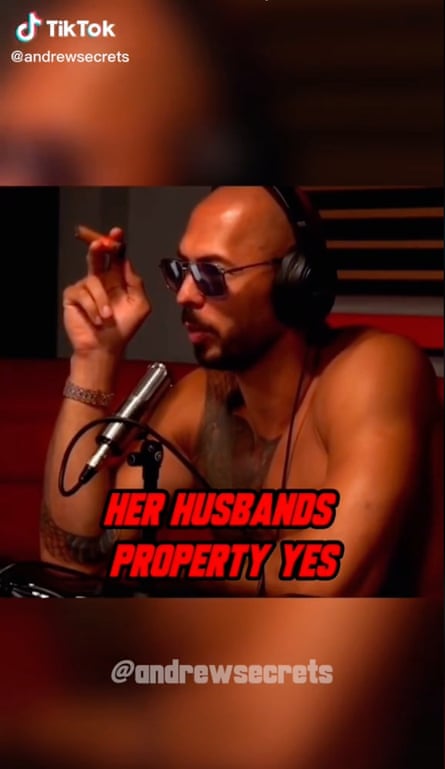Just under a year ago, I sat down with Enys, a 19-year-old Andrew Tate megafan. As we stared at each other from beneath our fringe haircuts, it felt like the hostility we might have expected had been disarmed by how much we looked alike. I am 23 and could imagine having a pint with Enys in the pub.
Enys is a “Tate success story”. He has hundreds of thousands of followers on TikTok and a pay-for-subscription “home boxing” course. It’s a business strategy remarkably similar to that of his idol, who sells fans a £40 monthly service on how to get rich online called the Real World. And for £6,000, you can enter Tate’s members club, the War Room.
Once a subscriber to the Real World, Enys explained that Tate had taught him discipline and diligence. Instead of finding trouble on the streets, he’d learned to make money online. Becoming financially successful, Enys said, made you a “high-value” male. Anything less is failure.

This is the Tate playbook: bravado, machismo, wealth. It has, as a new documentary, I Am Andrew Tate, highlights, brought him millions of followers online and supposed wealth counted – at least according to him – in millions of pounds. It has brought him notoriety: the once dirt-poor boy who grew up in Luton and gained fame as a kickboxer is now a self-proclaimed “megabrand” who is changing the conversation about what it is to “be a man”. It has brought a new home and lifestyle in Romania, where he now lives and where he is facing charges of rape, human trafficking and forming an organised crime group to sexually exploit women – all claims he denies.
And people like Enys love him. Not once in our chat did Enys mention Tate’s misogyny and exhortations that “real men” drive fast cars and treat women as property – all delivered to those millions of followers in the rat-a-tat-tat, big-muscles style which is catnip to a certain type of YouTube fan. In fact, of the many Tate fans I’ve spoken to – publicly and privately – none has said they follow him because they love what he has to say about women. YouGov data reveals that, of the 12% of men who “like” Tate in the UK, just over half say they share his views on women.
And right there is the issue I wanted to explore. Men, many of them young and impressionable, insist that Tate’s deliberate courting of controversy is not what attracts or affects them or has any effect on their views. When I show Enys a now-deleted clip of Tate saying he’d moved to Romania because of its less stringent attitude to rape accusations (something Tate has denied), he was surprised and said he didn’t support such a warped point of view.
But in the same interview, Enys looked directly at the camera and chuckled: “You women out there, you like a man who’s controlling, and you know that.”
Which is just the kind of thing Andrew Tate would say.

When the vast majority of violence against women is perpetrated by men, we have to take responsibility as men to explain to each other what is harmful about Tate’s attitudes. Too often, it’s people who aren’t the target audience who feel compelled to speak up – often women. As a journalist with the News Movement, a social-media news business that speaks in particular to gen Z audiences aged 18-25, I had an opportunity to redress some of that imbalance.
For a year I have been following the Tate story, making three documentaries on the manosphere – that world of back-slapping “men just need to be men” attitudes that so many regurgitate and let bleed into their real lives. As a young man, I felt an acute sense of responsibility given the sexist behaviour I engaged in as a teenager. Frankly, at that age many young men act without much thought about the consequences. They can reproduce what they see online without recognising the harm. I was lucky. Being held to account by friends and family gave me the chance to stop and think, and to develop better attitudes. We are all, of course, works in progress.
The question is why people are turning to the likes of Tate.
First, he, like the Canadian culture warrior Jordan Peterson, recognises the “plight” of young men. This is a disillusioned group who feel they’re getting a worse deal than in the past, and is real, even if the substance is awry. This feeling that “Tate genuinely cares about me” creates a visceral connection.
Second, Tate argues we can recapture what might be described as straight-man masculinity. He offers a return to the “golden age”: flash men, women in bikinis, physical prowess – James Bond with tattoos. Before Tate there was the glitzy Instagram influencer Dan Bilzerian and his assault rifles, and before him, Hugh Hefner and pornography. What separates Tate from past iterations isn’t just his charismatic oration but his offer that “you too can be like me”. It draws in followers like Eli, who worked on Tate’s marketing team for two years.

Eli started with so-called “red pill” online communities which spread conspiracy theories about a masculinity under threat from women. Isolated and impressionable, at age 20 Eli spent all his money to join the War Room – the private Telegram chatrooms that gave him access to his hero. Eli described the whole project as “a cult”.
He explained that Tate’s marketing strategy preys on an inferiority complex that many fans suffer from. This came to mind when I spoke to Maeve Park, who runs workshops on the manosphere in schools. She told me about one 14-year-old boy who, on the verge of tears, kept saying: “Women won’t love you if you’re poor – you have to be rich.”

Added to this are Tate’s attention-grabbing pivots, keeping audiences on their toes and hungry for more. We have had Tate the Brave, fighting the establishment, and Tate, Man of Piety, stretching and flexing towards new interests and audiences.
As with many populists, Tate often talks of a shady plot against him. And like the “prophet narrative” many populists adhere to, Tate predicted he would be deplatformed and then arrested. For his superfans, Tate’s arrest was a sign of credibility, not concern.
With his newfound piety comes the promotion of his charitable work, his family and his newfound faith, Islam. Eli says that Tate told him in Dubai that he had converted to Islam for business reasons. There are a lot of young Muslim men in the world, and faith is a good disinfectant for any past wrongs.
Tate argues differently, saying that a conservative form of Islam aligns with his traditionalist views on gender roles, relationships and masculinity. As one of his best friends, Joule Sullivan, told me: “His conversion was inevitable.” I also spoke to Muslims who know Tate personally about his conversion – they saw it as genuine – as well as Muslim men and women who spoke of their concerns about this being a full-frontal reputation wash.
Recently I discovered, with the help of open-source Google data, that “Andrew Tate” is a more popular search term in Muslim-majority countries than in the UK and the US. If Tate has become more popular globally, this could explain why his follower count on X rose by millions last year while support has reportedly waned in the UK.
Where next for this one-man man machine? One year on, the key thing I have come to understand is that Tate’s masculinity is steeped in pessimism – the idea that without people like him, things can only get worse. It was learned from his father, who by Tate’s own account suffered from a narcissistic personality disorder and bullied him. Tate teaches men to be ruled by insecurity, to control everyone and everything. With the prevalence of mental health issues affecting young men, you can see the appeal.
We are in the middle of a referendum on what it means to be a man. I sense many young men feel the world is telling them what masculinity is – including a shouting Tate – without bothering to ask them or listen to their thoughts. You’d be surprised by how open to discussion many of his fans are, and how critical they can be when they are faced with Tate’s views without the bravado.
Listening a little more to what men actually think, and how they can navigate a new world steeped in equity rather than domination, might make the future for Tate and those like him a little less secure.
I Am Andrew Tate is on Channel 4 on 7 January at 9pm

James Parker is a UK-based entertainment aficionado who delves into the glitz and glamour of the entertainment industry. From Hollywood to the West End, he offers readers an insider’s perspective on the world of movies, music, and pop culture.








